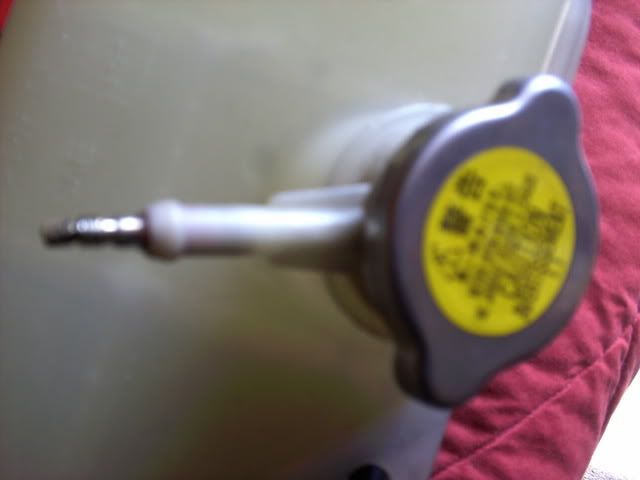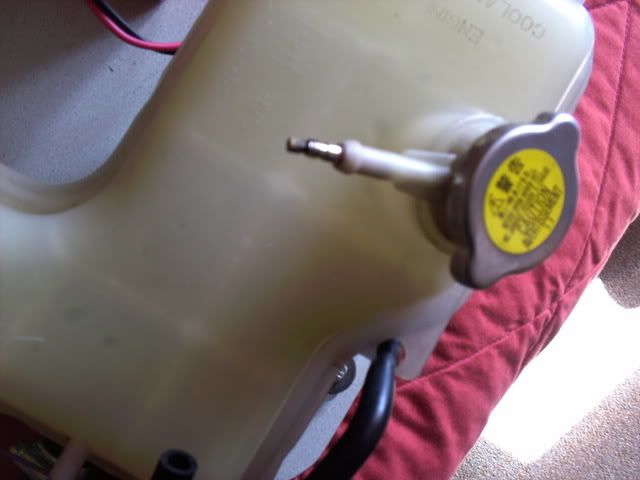Page 2 of 6
Posted: Thu Mar 27, 2008 12:57 am
by dandywarhol
Apart from the "sniffer" test with a gas analyser another method to test for a head gasket/cracked head is to use a cooling system pressure tester but instead of pressurising the system to check for a leak, run the engine to see if cylinder pressure is going into the tank, if it is it will show on the pressure gauge.
Posted: Thu Mar 27, 2008 1:02 am
by The Great Pretender
Simon Jones wrote:TGP - not bled it yet. Will flush it all out first & then try the 'see saw' method which seems to be the one most recommended.
Try this for me?
Fit a funnel on the bleed pipe, hold it above the tank and fill from there, it may take a while but it should purge the head.

Posted: Thu Mar 27, 2008 1:08 am
by The Great Pretender
dandywarhol wrote:Apart from the "sniffer" test with a gas analyser another method to test for a head gasket/cracked head is to use a cooling system pressure tester but instead of pressurising the system to check for a leak, run the engine to see if cylinder pressure is going into the tank, if it is it will show on the pressure gauge.
Intresting, can you explain more Dandy?
Posted: Thu Mar 27, 2008 1:18 am
by dandywarhol
One of
THESE pressure testers (also come with Bongo type fittings)

fitted to the radiator or tank would normally be used to pressurise the system to check for leaks. It can also be used to test pressure caps for blow off pressure.
If you connect it to the radiator/tank and start the engine you would expect a slight rise in pressure as the coolant heats up. If the pressure suddenly rises when you rev the engine then the blown head gasket/head crack is allowing compression pressure into the system and will register on the pressure gauge.
Posted: Thu Mar 27, 2008 12:24 pm
by Simon Jones
Thanks for the suggestion Dandy - might invest in one of those. You say it comes with Bongo-compatible fittings - so I dont get a blank look in my local motor factors, is there a more common vehicle with same fitting I could ask for?
Posted: Thu Mar 27, 2008 6:11 pm
by manners
I had the same problem with a Bongo I used to have, coolant out of expansion bottle and no pressure, tracked it down to a verry small indent where the expansion bottle cap seal sat so wasnt 100% sealed allowing presssure and somtimes coolant out. I could see a slight brown staining where the coolant had got passed the cap and up to the overflow.
Posted: Thu Mar 27, 2008 9:56 pm
by bigdaddycain
dandywarhol wrote:One of
THESE pressure testers (also come with Bongo type fittings)

fitted to the radiator or tank would normally be used to pressurise the system to check for leaks. It can also be used to test pressure caps for blow off pressure.
If you connect it to the radiator/tank and start the engine you would expect a slight rise in pressure as the coolant heats up. If the pressure suddenly rises when you rev the engine then the blown head gasket/head crack is allowing compression pressure into the system and will register on the pressure gauge.
I've never seen one of those before, they seem a useful tool...

Would temporary blocking of the overflow outlet make any difference to the readings?
Posted: Thu Mar 27, 2008 11:19 pm
by The Great Pretender
I think it would normally replace the pressure cap so not letting the overflow pipe communicate with the system.

PS
Dandy hase gone walkabout.

Posted: Fri Mar 28, 2008 12:52 am
by Simon Jones
Had a look in more detail at the pressure tester. It looks like that one on ebay has a specific fitting for Land Rover etc. There are universal kits available, but they are £150+. If its just a question of adding pressure via a one way valve & monitoring the pressure, then it should be possible to knock something up with a foot fump, gauge & some means of making a seal over the top of the expansion tank in place of the cap. I'll see what I have lying around the shed.
Spoke to Bellhill Garage - apparently, even after a problem has been fixed, in may cases the head will still go a few months later as it may have already been damaged. They also said that in all but one case they have looked at, a new head is the only long term solution. Not feeling too optimistic right now...
Posted: Fri Mar 28, 2008 1:23 pm
by coco bongo
Simon Jones wrote:
Spoke to Bellhill Garage - apparently, even after a problem has been fixed, in may cases the head will still go a few months later as it may have already been damaged. They also said that in all but one case they have looked at, a new head is the only long term solution. Not feeling too optimistic right now...
This seems to be the grim truth, as the guy who pressure tests heads down my way said that most of them he tests are cracked.
Such a shame that this happens, i know how you must be feeling.
I had the rad replaced first, along with thermostat and waterpump. Then the head went. Keep us posted.
Posted: Fri Mar 28, 2008 2:24 pm
by haydn callow
An easy way to get loads of pressure into the cooling system.
Get a high pressure valve out of a old pushbike innertube. Put a littie epoxy round the thread and it will screw in nicely cutting it's own thread.
When you have finished messing about it can be removed with a pair of pliers. Pump it up with a pump with a gauge on. Normal pressure in the tank is around 13psi.


Posted: Fri Mar 28, 2008 8:33 pm
by bigdaddycain
Simon Jones wrote:
Spoke to Bellhill Garage - apparently, even after a problem has been fixed, in may cases the head will still go a few months later as it may have already been damaged. They also said that in all but one case they have looked at, a new head is the only long term solution. Not feeling too optimistic right now...
The cylinder head gasket is a seal,surely it can't be as strong as the cylinder head itself? I thought they were designed to be the weak link in the chain to protect the head if caught early enough?
I've ran a sierra cosworth in the past at 27 P.S.I. Boost,(peak 35 P.S.I),and went through two triple layer head gaskets before i bit the bullet and settled on a W.R.C item,the head remained undamaged,after having it pressure tested each time a subsequent gasket failed...
Why is the head deemed scrap just because the gasket has blown? Is there an inherent fault with the bongo head?

Posted: Fri Mar 28, 2008 11:44 pm
by The Great Pretender
Posted: Fri Mar 28, 2008 11:52 pm
by mister munkey
bigdaddycain wrote:
Why is the head deemed scrap just because the gasket has blown? Is there an inherent fault with the bongo head?

Ready to take a barrage of abuse here but, as far as I'm aware, the head is alloy, the block is not.
A conflict of hot & cold reactions in radically different metals causes the (rare) failures.

Posted: Sat Mar 29, 2008 12:00 am
by The Great Pretender
Im with you MM, it never has made sense using materials with differing expansion rates, although lots do it.



